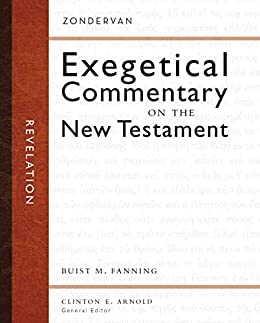Buist M. Fanning (DPhil, Oxford University) is Senior Professor Emeritus of New Testament Studies at Dallas Theological Seminary. Dr. Fanning has taught at DTS for more than 40 years, while serving also in various leadership positions at his local church and in teaching Christian workers in 10 foreign countries.
His passion is to know God and make Him known around the world and to see people transformed by the message of the Bible. His major teaching duties and research interests are New Testament Greek syntax and discourse analysis; New Testament criticism and backgrounds; and exegesis and theology of Romans, Pastoral Epistles, Hebrews, James, Peter, Jude, and Revelation.
1. What previous research and/or personal interests led you to this project and helped prepare you to write this commentary on Revelation?
I took a seminary class on Revelation from S. Lewis Johnson in the early seventies and later taught through the book two different times in a church setting (adult Bible class). More recently I taught classes on Jewish apocalyptic literature in seminary doctoral seminars.
When the invitation came to contribute this commentary to the ZECNT series, the prospect of digging further into Revelation itself intrigued me. But I was more of a learner than an expert when I started working on it.
Compare the ZECNT commentary series to 50 others here: Best Bible Commentary Series: The Top 50.
2. Who is the intended audience for this commentary? Would it benefit pastors? professors? students? lay Christians in the local church?
The commentary is definitely written more for the church than for the academy. But even for ministry in a church setting, Revelation’s interpretive issues come at a pastor or teacher fast and furious. So I wanted to show a range of interpretive options and provide as much rationale as possible for the views I presented in discussing the meaning of the book for today.
Also I have always admired those Christians in the pew (not ministry professionals) who find time to read more deeply about the Bible and theology to inform their own personal faith and lay ministry. I hope this commentary is useful for those believers as well.
3. What is unique about this commentary? What contribution does it make to studies of Revelation?
I think the format of the ZECNT series is unique, and many who have used other volumes in the series have seen the value of its mix of solid scholarship with features that help a preacher or teacher prepare compelling messages for today’s church. It works carefully with the Greek text but presents the results in a form that’s easily accessible for the non-specialist.
What this commentary contributes to studies of Revelation are: (1) its approach to Greek usage based on more recent studies in linguistics; (2) its understanding of how Revelation fulfills the Old Testament as the culmination of biblical prophecy; (3) its attention to ancient Jewish literature as a resource for seeing how John’s original readers would have understood the book’s symbolism and theological ideas; and (4) its sensible treatment of how the often-puzzling imagery of the book worked for its original audience—and works for us today.
Many people want commentaries on Revelation because it can be challenging to understand. See Best Revelation Commentaries to learn more.
4. What section or passage of this commentary was particularly memorable to research and write? Why?
Memorable for me was not any single section but the growing realization of how appropriate Revelation is as the last book in the Bible. My appreciation of other portions of Scripture was enhanced amazingly by digging into Revelation.
Seeing the end of the story helps us to see more clearly how the rest of it fits together. Christians (and their pastors and teachers) who shy away from Revelation for whatever reason are missing out on seeing the whole Bible more clearly.
5. What personally edified you in writing this commentary, increasing your affections for Christ?
Like many others, I am captivated by two scenes in the book: the picture of heavenly worship in chapters 4–5 and of God’s renewal of all things in chapters 21–22. The first shows the true and living God on his heavenly throne and Jesus Christ as the focal point of history, acclaimed as worthy by all of heaven and by humans from every tribe and language and people and nation redeemed by his sacrifice. It challenges me to join in worshipping him and to live in a different way in our self-absorbed culture.
And John’s vision of the abolition of all death, mourning, crying, and pain followed by communion with our God and with Christ in his presence forever in his renewed creation. This gives hope even in our most challenging times. Revelation is a book that constantly elicits a faithful and obedient response of heart and life, not just curiosity of what’s going to happen next.
6. Besides your commentary, what are your top recommended books (commentaries or otherwise) on Revelation?
[Editor’s note: the links provided lead to Amazon.com using the book’s exact ISBN.]
The two commentaries I recommend for pastors and teachers are by Grant Osborne in the Baker Exegetical series (extensive) and Scott Duvall in the Teach the Text series (briefer but very insightful for contemporary application). A more technical but masterful set of studies (not a commentary per se) is Richard Bauckham, Climax of Prophecy (A wealth of careful observations about Revelation and its OT background; the best treatment of the book’s literary structure and valuable insights on its theology and its relationship to the canon of Scripture).
7. What is next for you? What project are you currently working on? How can people follow your work and ministry?
I am working on a major commentary on Hebrews (Evangelical Exegetical Commentary) and a shorter one on the Pastoral Letters (Kregel’s Kerux series).
“Exegetical” is one type of Bible commentary, bu there are others. See Types of Bible Commentaries: A Guide for Bible Readers to discover which one is right for your purposes.
Own Buist Fanning’s Revelation commentary:
Get this commentary on Amazon using its exact ISBN.
Learn more about Dr. Fanning on his DTS faculty page.
Also see:
Compare the ZECNT commentary series with over 70 others on this comparison chart
Recent Posts
David Jeremiah, a renowned pastor, author, and speaker, has captivated the hearts of many with his compelling sermons. His messages resonate deeply with diverse audiences, leaving an enduring...
Tim Keller, a distinguished pastor, theologian, and author, has garnered a devoted following through the profound impact of his sermons. In this article, we will explore seven compelling reasons...


